Strategic Analysis: AstraZeneca's Expatriate Management Approach
VerifiedAdded on 2023/04/23
|5
|1105
|330
Report
AI Summary
This report critically analyzes AstraZeneca’s expatriate management practices, highlighting the company's strategies for communicating mission and vision to expatriates, training and screening processes, and the role of International Assignment managers. It addresses the challenges expatriates face, such as managing work-life balance and adjusting to foreign environments, and suggests mitigation strategies like providing flexibility, family visits, and 'me time'. Furthermore, the report explores decisions organizations can make to maximize benefits from expatriates during economic downturns, emphasizing the importance of careful employee selection, short-term assignments, and meaningful training. The report concludes that a focus on knowledge creation, leadership development, and responding to corporate needs are crucial for successful international assignments. Desklib provides access to similar solved assignments and resources for students.
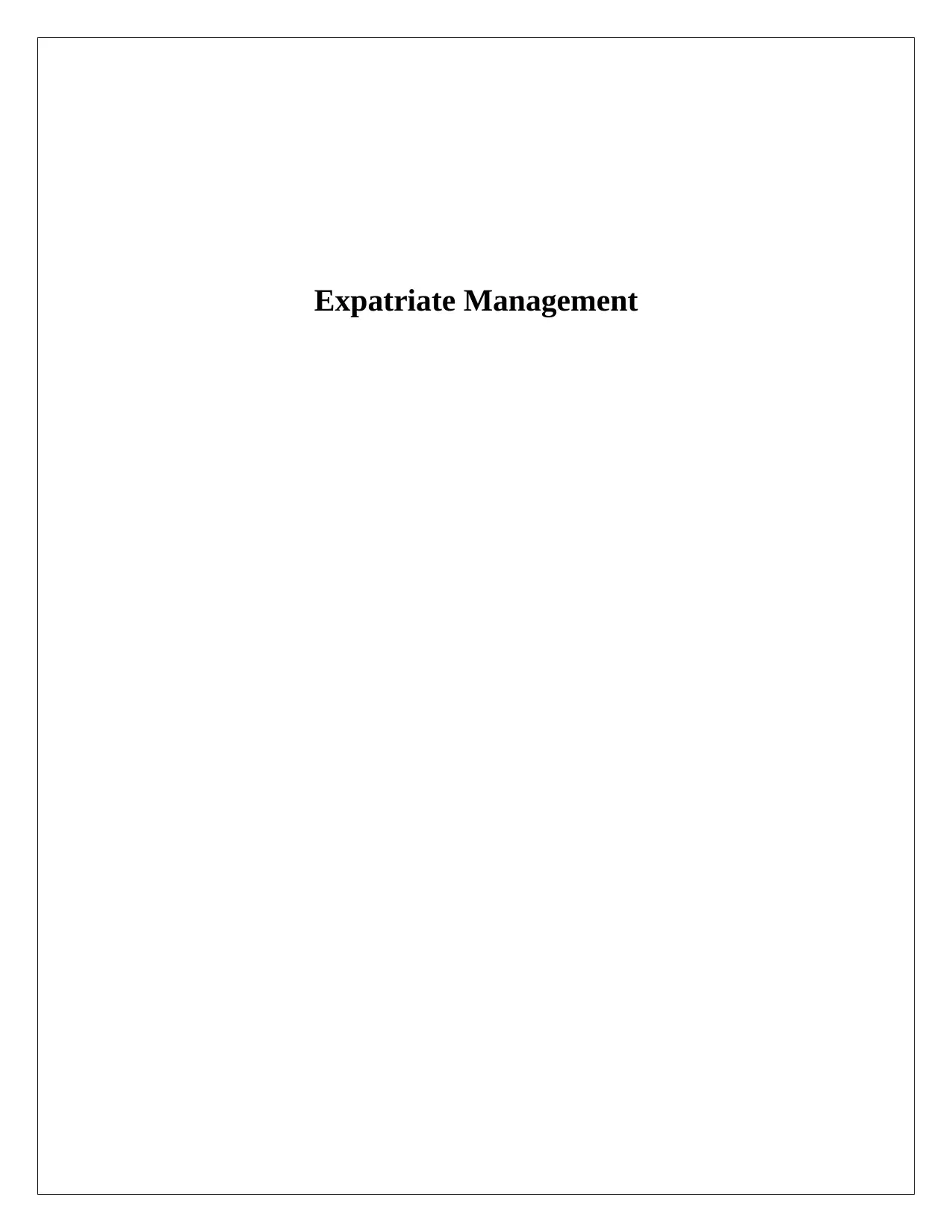
Expatriate Management
Paraphrase This Document
Need a fresh take? Get an instant paraphrase of this document with our AI Paraphraser
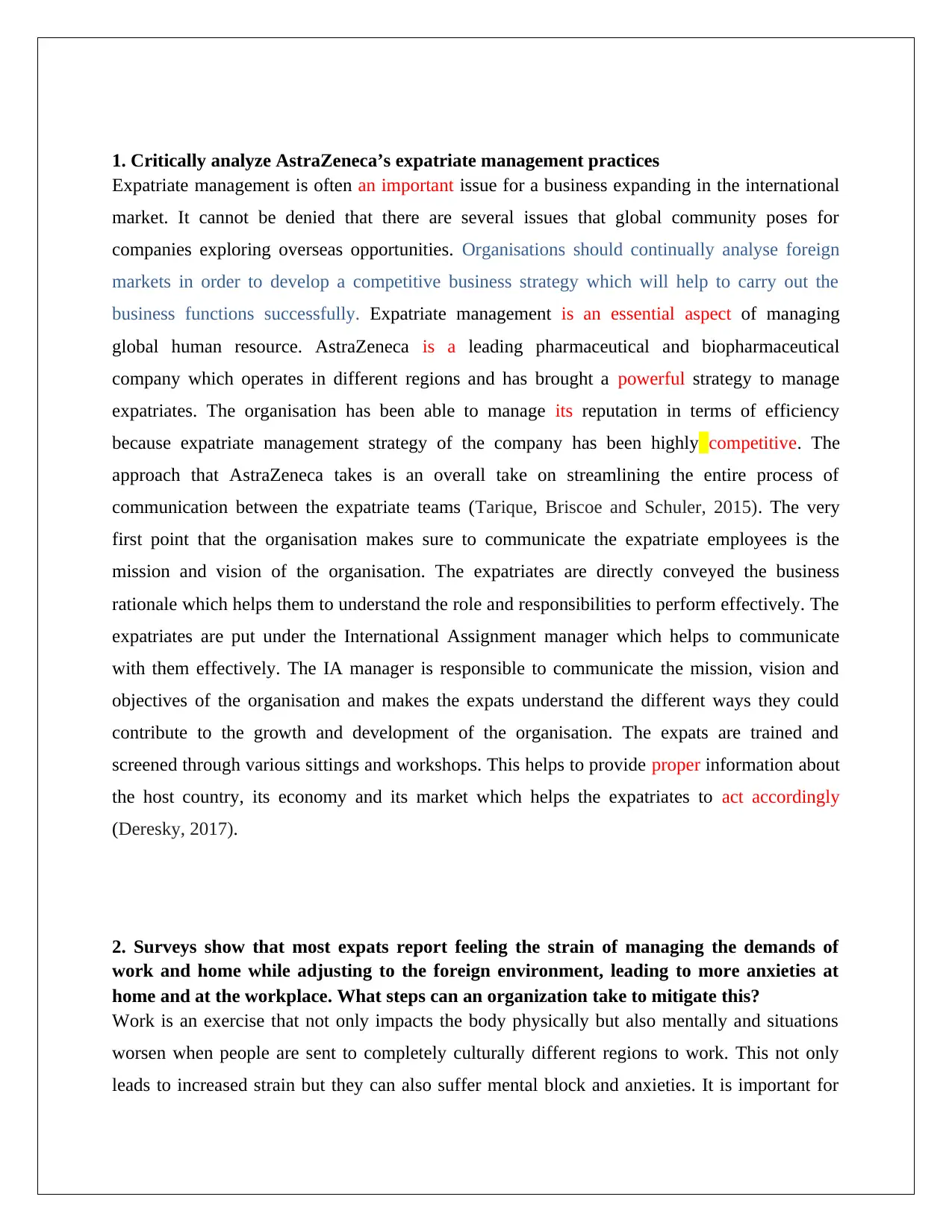
1. Critically analyze AstraZeneca’s expatriate management practices
Expatriate management is often an important issue for a business expanding in the international
market. It cannot be denied that there are several issues that global community poses for
companies exploring overseas opportunities. Organisations should continually analyse foreign
markets in order to develop a competitive business strategy which will help to carry out the
business functions successfully. Expatriate management is an essential aspect of managing
global human resource. AstraZeneca is a leading pharmaceutical and biopharmaceutical
company which operates in different regions and has brought a powerful strategy to manage
expatriates. The organisation has been able to manage its reputation in terms of efficiency
because expatriate management strategy of the company has been highly competitive. The
approach that AstraZeneca takes is an overall take on streamlining the entire process of
communication between the expatriate teams (Tarique, Briscoe and Schuler, 2015). The very
first point that the organisation makes sure to communicate the expatriate employees is the
mission and vision of the organisation. The expatriates are directly conveyed the business
rationale which helps them to understand the role and responsibilities to perform effectively. The
expatriates are put under the International Assignment manager which helps to communicate
with them effectively. The IA manager is responsible to communicate the mission, vision and
objectives of the organisation and makes the expats understand the different ways they could
contribute to the growth and development of the organisation. The expats are trained and
screened through various sittings and workshops. This helps to provide proper information about
the host country, its economy and its market which helps the expatriates to act accordingly
(Deresky, 2017).
2. Surveys show that most expats report feeling the strain of managing the demands of
work and home while adjusting to the foreign environment, leading to more anxieties at
home and at the workplace. What steps can an organization take to mitigate this?
Work is an exercise that not only impacts the body physically but also mentally and situations
worsen when people are sent to completely culturally different regions to work. This not only
leads to increased strain but they can also suffer mental block and anxieties. It is important for
Expatriate management is often an important issue for a business expanding in the international
market. It cannot be denied that there are several issues that global community poses for
companies exploring overseas opportunities. Organisations should continually analyse foreign
markets in order to develop a competitive business strategy which will help to carry out the
business functions successfully. Expatriate management is an essential aspect of managing
global human resource. AstraZeneca is a leading pharmaceutical and biopharmaceutical
company which operates in different regions and has brought a powerful strategy to manage
expatriates. The organisation has been able to manage its reputation in terms of efficiency
because expatriate management strategy of the company has been highly competitive. The
approach that AstraZeneca takes is an overall take on streamlining the entire process of
communication between the expatriate teams (Tarique, Briscoe and Schuler, 2015). The very
first point that the organisation makes sure to communicate the expatriate employees is the
mission and vision of the organisation. The expatriates are directly conveyed the business
rationale which helps them to understand the role and responsibilities to perform effectively. The
expatriates are put under the International Assignment manager which helps to communicate
with them effectively. The IA manager is responsible to communicate the mission, vision and
objectives of the organisation and makes the expats understand the different ways they could
contribute to the growth and development of the organisation. The expats are trained and
screened through various sittings and workshops. This helps to provide proper information about
the host country, its economy and its market which helps the expatriates to act accordingly
(Deresky, 2017).
2. Surveys show that most expats report feeling the strain of managing the demands of
work and home while adjusting to the foreign environment, leading to more anxieties at
home and at the workplace. What steps can an organization take to mitigate this?
Work is an exercise that not only impacts the body physically but also mentally and situations
worsen when people are sent to completely culturally different regions to work. This not only
leads to increased strain but they can also suffer mental block and anxieties. It is important for
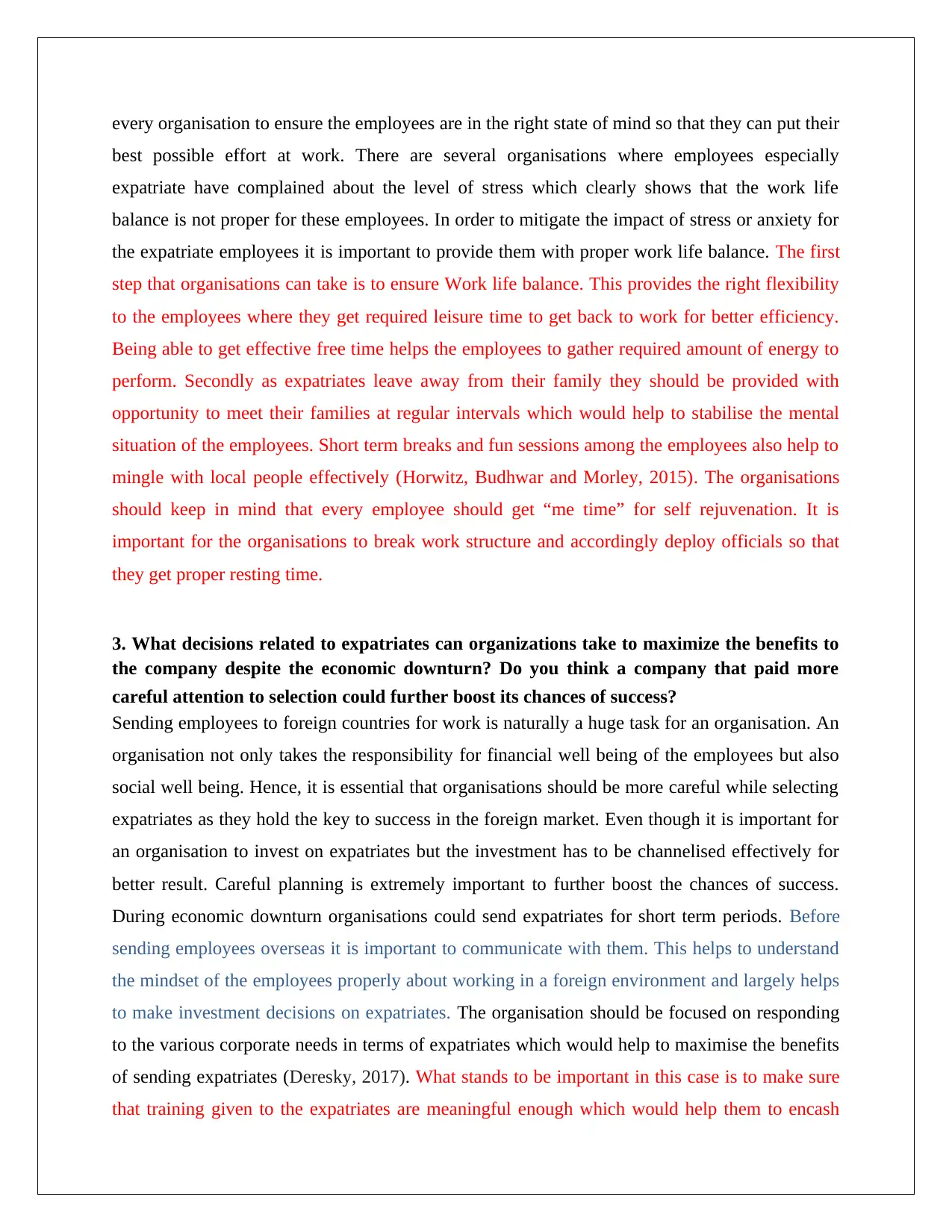
every organisation to ensure the employees are in the right state of mind so that they can put their
best possible effort at work. There are several organisations where employees especially
expatriate have complained about the level of stress which clearly shows that the work life
balance is not proper for these employees. In order to mitigate the impact of stress or anxiety for
the expatriate employees it is important to provide them with proper work life balance. The first
step that organisations can take is to ensure Work life balance. This provides the right flexibility
to the employees where they get required leisure time to get back to work for better efficiency.
Being able to get effective free time helps the employees to gather required amount of energy to
perform. Secondly as expatriates leave away from their family they should be provided with
opportunity to meet their families at regular intervals which would help to stabilise the mental
situation of the employees. Short term breaks and fun sessions among the employees also help to
mingle with local people effectively (Horwitz, Budhwar and Morley, 2015). The organisations
should keep in mind that every employee should get “me time” for self rejuvenation. It is
important for the organisations to break work structure and accordingly deploy officials so that
they get proper resting time.
3. What decisions related to expatriates can organizations take to maximize the benefits to
the company despite the economic downturn? Do you think a company that paid more
careful attention to selection could further boost its chances of success?
Sending employees to foreign countries for work is naturally a huge task for an organisation. An
organisation not only takes the responsibility for financial well being of the employees but also
social well being. Hence, it is essential that organisations should be more careful while selecting
expatriates as they hold the key to success in the foreign market. Even though it is important for
an organisation to invest on expatriates but the investment has to be channelised effectively for
better result. Careful planning is extremely important to further boost the chances of success.
During economic downturn organisations could send expatriates for short term periods. Before
sending employees overseas it is important to communicate with them. This helps to understand
the mindset of the employees properly about working in a foreign environment and largely helps
to make investment decisions on expatriates. The organisation should be focused on responding
to the various corporate needs in terms of expatriates which would help to maximise the benefits
of sending expatriates (Deresky, 2017). What stands to be important in this case is to make sure
that training given to the expatriates are meaningful enough which would help them to encash
best possible effort at work. There are several organisations where employees especially
expatriate have complained about the level of stress which clearly shows that the work life
balance is not proper for these employees. In order to mitigate the impact of stress or anxiety for
the expatriate employees it is important to provide them with proper work life balance. The first
step that organisations can take is to ensure Work life balance. This provides the right flexibility
to the employees where they get required leisure time to get back to work for better efficiency.
Being able to get effective free time helps the employees to gather required amount of energy to
perform. Secondly as expatriates leave away from their family they should be provided with
opportunity to meet their families at regular intervals which would help to stabilise the mental
situation of the employees. Short term breaks and fun sessions among the employees also help to
mingle with local people effectively (Horwitz, Budhwar and Morley, 2015). The organisations
should keep in mind that every employee should get “me time” for self rejuvenation. It is
important for the organisations to break work structure and accordingly deploy officials so that
they get proper resting time.
3. What decisions related to expatriates can organizations take to maximize the benefits to
the company despite the economic downturn? Do you think a company that paid more
careful attention to selection could further boost its chances of success?
Sending employees to foreign countries for work is naturally a huge task for an organisation. An
organisation not only takes the responsibility for financial well being of the employees but also
social well being. Hence, it is essential that organisations should be more careful while selecting
expatriates as they hold the key to success in the foreign market. Even though it is important for
an organisation to invest on expatriates but the investment has to be channelised effectively for
better result. Careful planning is extremely important to further boost the chances of success.
During economic downturn organisations could send expatriates for short term periods. Before
sending employees overseas it is important to communicate with them. This helps to understand
the mindset of the employees properly about working in a foreign environment and largely helps
to make investment decisions on expatriates. The organisation should be focused on responding
to the various corporate needs in terms of expatriates which would help to maximise the benefits
of sending expatriates (Deresky, 2017). What stands to be important in this case is to make sure
that training given to the expatriates are meaningful enough which would help them to encash
⊘ This is a preview!⊘
Do you want full access?
Subscribe today to unlock all pages.

Trusted by 1+ million students worldwide
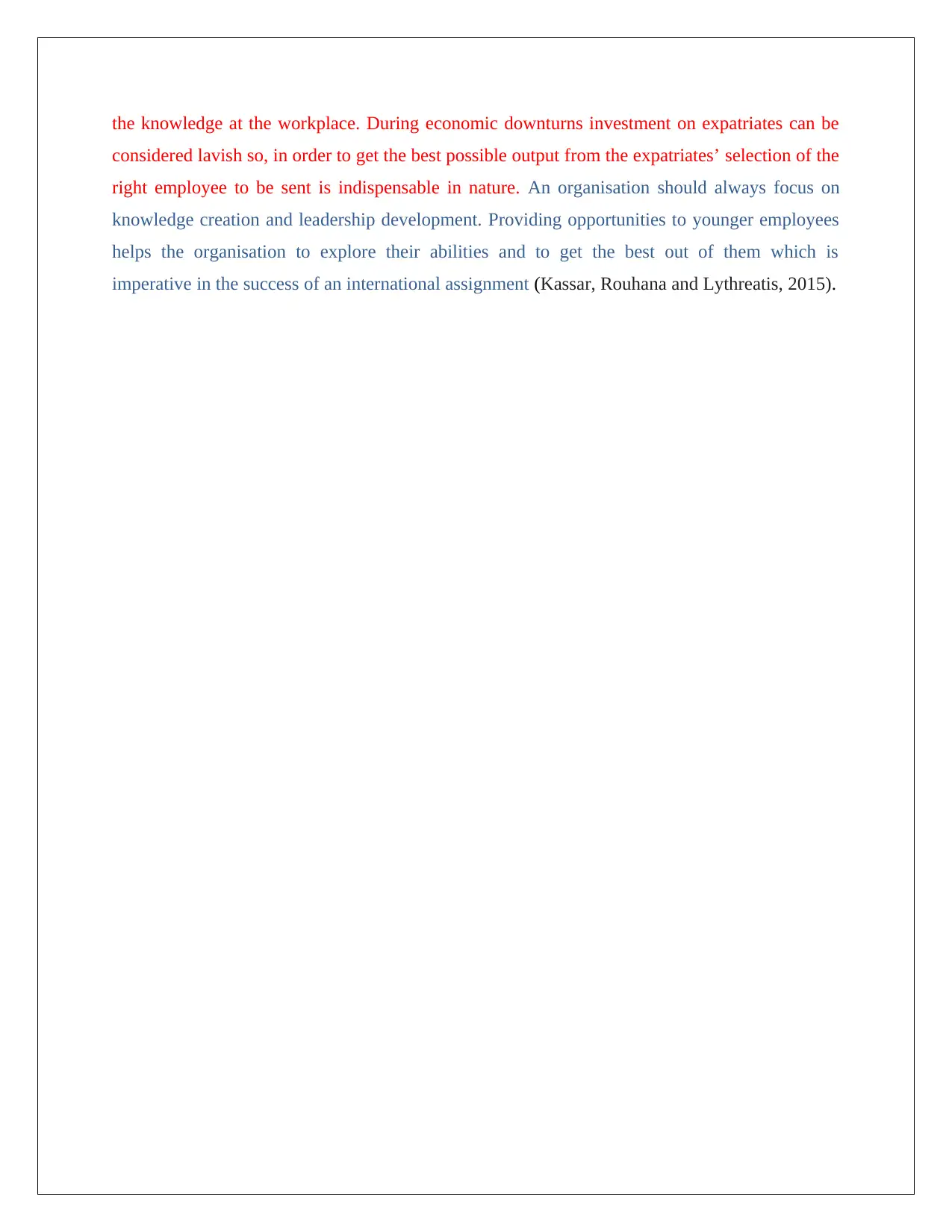
the knowledge at the workplace. During economic downturns investment on expatriates can be
considered lavish so, in order to get the best possible output from the expatriates’ selection of the
right employee to be sent is indispensable in nature. An organisation should always focus on
knowledge creation and leadership development. Providing opportunities to younger employees
helps the organisation to explore their abilities and to get the best out of them which is
imperative in the success of an international assignment (Kassar, Rouhana and Lythreatis, 2015).
considered lavish so, in order to get the best possible output from the expatriates’ selection of the
right employee to be sent is indispensable in nature. An organisation should always focus on
knowledge creation and leadership development. Providing opportunities to younger employees
helps the organisation to explore their abilities and to get the best out of them which is
imperative in the success of an international assignment (Kassar, Rouhana and Lythreatis, 2015).
Paraphrase This Document
Need a fresh take? Get an instant paraphrase of this document with our AI Paraphraser
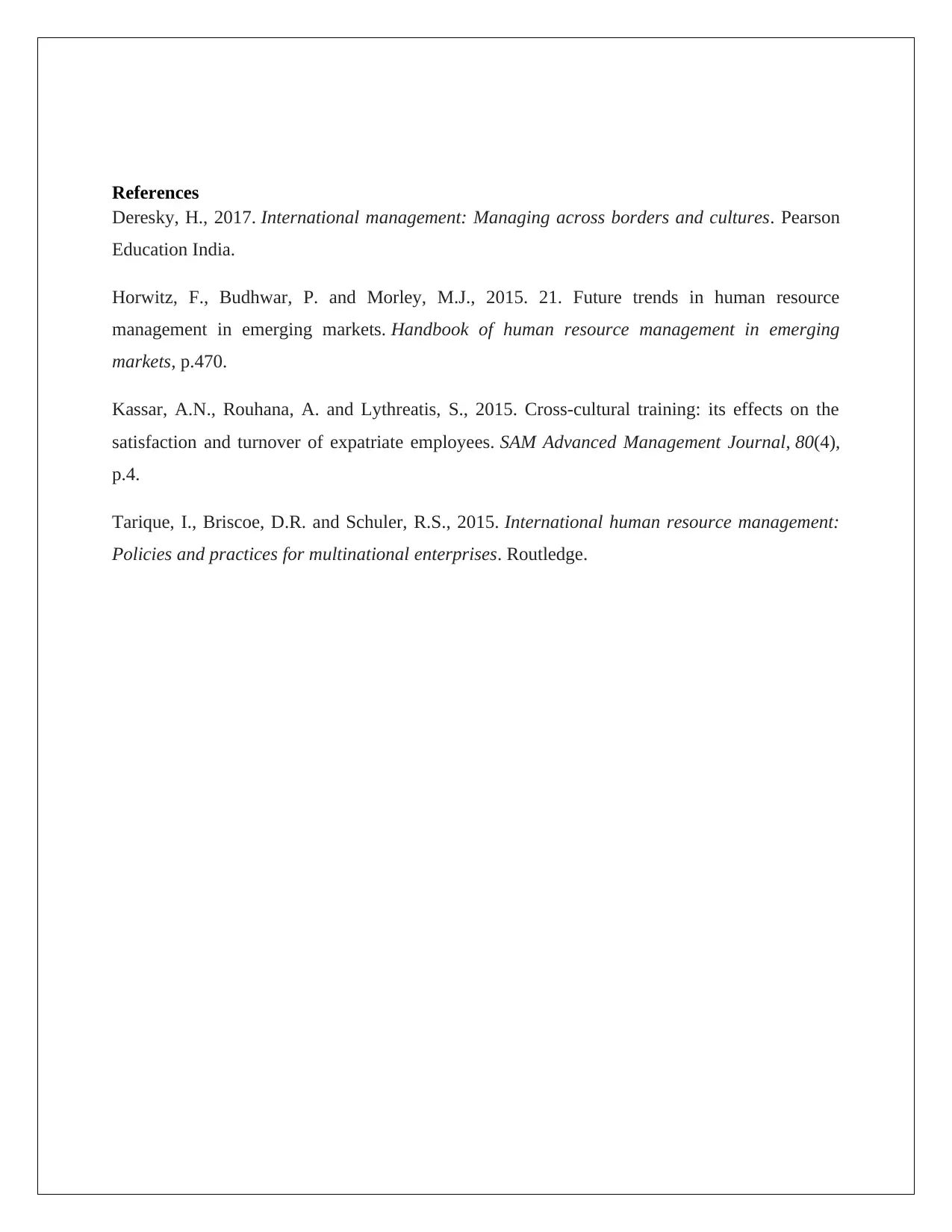
References
Deresky, H., 2017. International management: Managing across borders and cultures. Pearson
Education India.
Horwitz, F., Budhwar, P. and Morley, M.J., 2015. 21. Future trends in human resource
management in emerging markets. Handbook of human resource management in emerging
markets, p.470.
Kassar, A.N., Rouhana, A. and Lythreatis, S., 2015. Cross-cultural training: its effects on the
satisfaction and turnover of expatriate employees. SAM Advanced Management Journal, 80(4),
p.4.
Tarique, I., Briscoe, D.R. and Schuler, R.S., 2015. International human resource management:
Policies and practices for multinational enterprises. Routledge.
Deresky, H., 2017. International management: Managing across borders and cultures. Pearson
Education India.
Horwitz, F., Budhwar, P. and Morley, M.J., 2015. 21. Future trends in human resource
management in emerging markets. Handbook of human resource management in emerging
markets, p.470.
Kassar, A.N., Rouhana, A. and Lythreatis, S., 2015. Cross-cultural training: its effects on the
satisfaction and turnover of expatriate employees. SAM Advanced Management Journal, 80(4),
p.4.
Tarique, I., Briscoe, D.R. and Schuler, R.S., 2015. International human resource management:
Policies and practices for multinational enterprises. Routledge.
1 out of 5
Related Documents
Your All-in-One AI-Powered Toolkit for Academic Success.
+13062052269
info@desklib.com
Available 24*7 on WhatsApp / Email
![[object Object]](/_next/static/media/star-bottom.7253800d.svg)
Unlock your academic potential
Copyright © 2020–2025 A2Z Services. All Rights Reserved. Developed and managed by ZUCOL.





